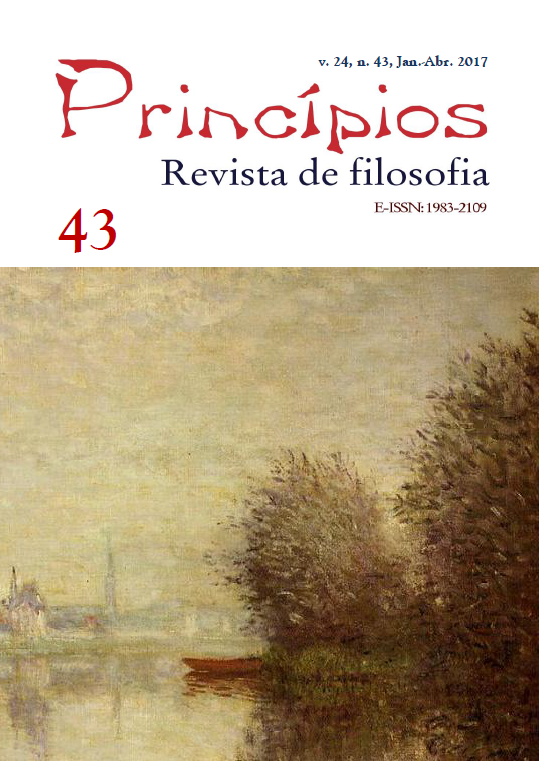Heidegger e o projeto de superação da subjetividade [Heidegger and the project of overcoming of subjectivity]
DOI :
https://doi.org/10.21680/1983-2109.2017v24n43ID11374Mots-clés :
Superação da metafísica, Subjetividade, Temporalidade, Ser [Overcoming of Metaphysics, Subjectivity, Temporality, Being]Résumé
Nosso objetivo é mostrar como o projeto heideggeriano de superação da metafísica ocidental enquanto um retorno à questão do ser enquanto ser, simultaneamente, implica em um projeto de superação da subjetividade. Utilizaremos a proposta de classificação elaborada pelos estudiosos do pensamento heideggeriano, para pontuarmos o tema da superação da subjetividade. Em seguida, indicaremos porque a temporalidade do Dasein (Ser e tempo) e a Temporalität do ser (Os problemas fundamentais de fenomenologia) constituem momentos distintos da superação da metafísica e da subjetividade, visto que ser não é mais concebido como substância, mas como temporalidade; e o homem não é mais entendido como sujeito, mas como Dasein. Assim, concluímos que o ser do homem não é mais determinado como subjetividade, mas como temporalidade.
[Our aim is to show how the Heiddegerian Project of overcoming of Western Metaphysics through a return to the question of being as being, implies, at the same time, a project of overcoming of subjectivity. Based on the classification elaborated by Heideggerian scholars, we will start by locating the question of subjectivity in Heidegger’s work. Next, we will discuss why the temporality of Dasein (Being and Time) and the Temporalität of being (The Basic Problems of Phenomenology) are different moments of overcoming both Metaphysics and subjectivity, in the sense that being is no longer understood as substance, but as temporality; and mankind is no longer understood as subject but as Dasein. This reflexion enables us to conclude that for Heidegger it is not subjectivity but temporality that constitutes the being of mankind.]
Téléchargements
Références
BUREN, John van. The young Heidegger: rumor of the hidden king. Bloomington: Indiana University Press, 1994.
DREYFUS, Hubert. Being-in-the-World: a commentary on Heidegger's Being and Time, Division I. Cambridge; London: MIT Press, 1991.
FERREIRA, Acylene M. C. Existência e significância. In: DAMON, Luiz M. et al. Ensaios de Filosofia em homenagem a Carlo Alberto R. de Moura. Paraná: UFPR, 2015.
GRONDIN, Jean. Le tournant dans la pensée de Martin Heidegger. Paris: PUF, 1987.
HEIDEGGER, Martin. Kehre. In: HEIDEGGER, Martin. Opuscula 1: aus Wissenschaft und Dichtung. Pfullingen: G. Neske, 1962.
HEIDEGGER, Martin. Zähringen Seminar. In: HEIDEGGER, Martin. Questions IV. Paris: Gallimard, 1976.
HEIDEGGER, Martin. History of the concept of time: prolegomena. Trad. Theodore Kiesel. Indianapolis: Indiana University Press, 1992.
HEIDEGGER, Martin. Introdução à metafisica. Trad. Emmanuel Carneiro Leão. Rio de Janeiro: Tempo Brasileiro, 1999.
HEIDEGGER, Martin. Contributions to Philosophy (of the Event). Trad. Richard Rojcewicz e Daniela Vallega-Neu. Indiana: Indiana University Press, 2002.
HEIDEGGER, Martin. Preface. In: RICHARDSON, William J. Heidegger: through phenomenology to thought. New York: Fordham University Press, 2003a. p. XVI-XXII.
HEIDEGGER, Martin. Conceitos fundamentais de metafísica: mundo, finitude, solidão. Trad. Marco A. Casanova. Rio de Janeiro: Forense Universitária, 2003b.
HEIDEGGER, Martin. Ser e tempo. Trad. Marcia Sá Cavalcante Schuback. Petrópolis: Vozes, 2006.
HEIDEGGER, Martin. Ensaios e Conferências. Trad. Emmanuel Carneiro Leão, Gilvan Fogel e Marcia Sá Cavalcante Schuback. Petrópolis: Vozes, 2008a.
HEIDEGGER, Martin. Marcas do caminho. Trad. Ênio Paulo Giachini e Ernildo Stein. Petrópolis: Vozes, 2008b.
HEIDEGGER, Martin. Os problemas fundamentais de fenomenologia. Trad. Marco A. Casanova. Petrópolis: Vozes, 2012.
HEIDEGGER, Martin. Zum Ereignis-Denken. Frankfurt am Main: V. Klostermann, 2013.
HUSSERL, Edmund. Investigações lógicas. Segundo volume, parte I. Investigações para a fenomenologia e a teoria do conhecimento. Trad. Pedro M. S. Alves e Carlos A. Morujão. Lisboa: Centro de Filosofia da Universidade de Lisboa, 2007.
KISIEL, Theodore. The genesis of Heidegger's Being and Time. Berkeley; Los Angeles; London: University of California Press, 1995.
KISIEL, Theodore. Why students of Heidegger will have to read Emil Lask. In: DENKER, Alfred; HEINZ, Marion. (Ed.). Heidegger’s ways of thought: critical and interpretative signposts. New York; London: Continuum, 2002. p. 101-136.
RAFFOUL, François. Heidegger and the subject. Trad. David Pettigrew e Gregory Recco. New Jersey: Humanities, 1998.
SALLIS, John. End(s). In: SALLIS, John. Delimitations: phenomenology and the end of metaphysics. Bloomington; Indianapolis: Indiana University Press, 1995.
SCHARFF, Robert. Becoming a philosopher: what Heidegger learned from Dilthey, 1919–25. British Journal for the History of Philosophy. v. 21, n. 1, 2013, p. 122-142.
SHEEHAN, Thomas. A paradigm shift in Heidegger research. Continental Philosophy Review, 34, 2001, p. 183-202.
Téléchargements
Publié-e
Comment citer
Numéro
Rubrique
Licence
Autores mantêm os direitos autorais e concedem à revista o direito de primeira publicação, com o trabalho simultaneamente licenciado sob a Licença Creative Commons Attribution que permite o compartilhamento do trabalho com reconhecimento da autoria e publicação inicial nesta revista.
Termos da licença:
| Não Comercial (NC) | Os licenciados podem copiar, distribuir, exibir e executar a obra e fazer trabalhos derivados dela, desde que sejam para fins não comerciais. |
| Compartilha Igual (SA) | Os licenciados devem distribuir obras derivadas somente sob uma licença idêntica à que governa a obra original ou menos restritiva. |


 Português (Brasil)
Português (Brasil) English
English Español (España)
Español (España) Français (Canada)
Français (Canada)


